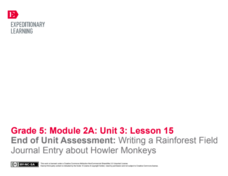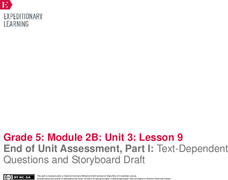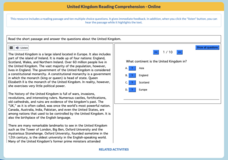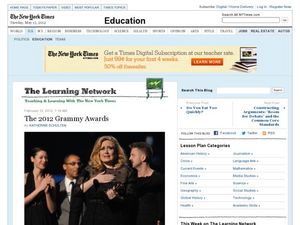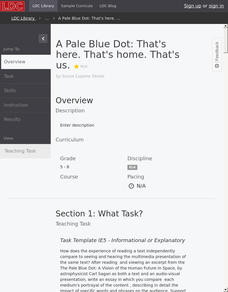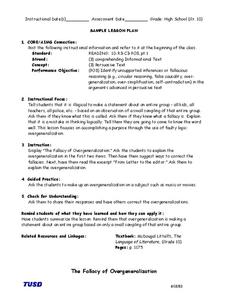EngageNY
End of Unit Assessment: Writing a Rainforest Field Journal Entry about Howler Monkeys
Give me more details. Scholars complete an end of unit assessment by creating an information text box to go with their field journal entries about howler monkeys. Learners use the class time to work independently.
EngageNY
End of Unit Assessment, Part 1: Text-Dependent Questions and Storyboard Draft: “You Can Do a Graphic Novel” Excerpt
Eyes on the finish line. Serving as the first part of the end of unit assessment, learners answer questions based on a text about how to write a graphic novel. Using what they've learned, they then create a storyboard about the invention...
Curated OER
Analyzing Two or More Nonfiction Texts
How does recognizing the author's purpose help you draw conclusions about a topic? Using two articles (both are attached), learners brainstorm why each author wrote each article. Are their purposes similar or different? Learners use a...
EngageNY
Conducting Research: Analyzing a Variety of Sources to Capture Information about My Insect
From picture to words. Scholars analyze a picture of an ant and then list two facts they observed and any questions that may arise. Expert groups from the previous instructional activity then look at a diagram about either an ant or...
Curated OER
Reading Comprehension: Thunder and Lightning
Thunder and lightning are so exciting! Your class gets to read all about it. This informational reading passage provides them with a scientific explanation of thunder and lightning. They read the passage, answer comprehension questions,...
T. Smith Publishing
Earth
Young astronomers read an informational text passage and then answer questions based on what they read.
TLS Books
Neptune
Did you know that Neptune is named after the Roman god of the sea? Young astronomers read about this and other facts about the eighth planet from the sun in a short informational text passage.
TLS Books
Uranus
After reading an informational text passage, learners answer four multiple choice questions about the third largest planet in our solar system.
TLS Books
Jupiter
Young astronomers read an informational text on the gas giant, Jupiter. Then they answer four multiple choice questions based on what they read.
Mr. Nussbaum
United Kingdom
An interactive practice tests scholars' reading comprehension skills. Learners read an informative text, then answer 10 questions.
Curated OER
Identifying Text Features of a Self-Written Fable
Make learning the parts of a book fun by having pupils construct their own glossary entries, table of contents, and title page. Beginning with a review of text features and a hunt for examples, kids use previously written fables to...
Curated OER
Where in the World is Mrs. Waffenschmidt? #11
Boats, gondolas, and narrow canals! Sounds like Mrs. Waffenschmidt is hanging out in Venice, Italy. Your class needs to read the informational paragraph and use what they know about geography and culture to determine this mysterious...
Curated OER
Where in the World in Mrs. Waffenschmidt? #3
Not only does the class need to find out where Mrs. Waffenschmidt is, they need to name the famous author from that country. They read the informational passage, use the clues given, and determine the author's name and the teacher's...
Curated OER
Where the Books Are
The news is full of interesting stories and ideas shared in an informational style. Readers use the provided who, what, when, where, and why questions as they explore an article about a man who is passionate about archiving physical...
Curated OER
New Rules for Sunscreens
What are UVB and UVB rays, and why isn't my sunscreen good enough? Kids find out all the newest information regarding sunscreen and skin cancer as they read this New York Times article. They read the article then answer eight related...
Curated OER
The 2012 Grammy Awards
Kids answer 11 who, what, when, where, and why questions after reading a New York Times article about the Grammy Awards. Boosting reading comprehension by reading about a topical event keeps pupils informed and interested. A related blog...
Curated OER
The Value of Facebook
Does Facebook actually have any value? Find out what the New York Times thinks by reading this informational article. Learners use the 10 guiding questions to aid them as the read the provided article regarding the value of Facebook. Two...
Curated OER
Reading about Recent Exhibits in the Art and Design Section
A large part of analyzing or understanding art is knowing how to read about it. The New York Times has put together these who, what, where, when, and how questions to aid learners in comprehending informational pieces related to art and...
Curated OER
Reacting to the Rapture
FamilyRadio.com publicized that the Rapture or Judgement Day would happen on May 21, 2011, it didn't. Informed students read a New York Times article on the topic, then answer nine related comprehension questions.
Curated OER
Hopeful Eyes on Southern Skies
The Times covered a drought in 2011, which affected producers, consumers, and sellers. The class gets informed about climate and the economics of agriculture as the read this article and answer each of the 11 comprehension questions. A...
Curated OER
America: The Story of Us Episode 6: The Heartland
I love handouts that include reading passages and discussion questions.Here you will find two pages. Page one provides an informational reading passage and six discussion questions. Page two provides a three paragraph primary-source...
Core Knowledge Foundation
The Civil War
A 48-page Student Reader focuses on the Civil War. Scholars gain information from a text that explores when, why, and where the Civil War occurred, as well as important people such as Harriet Beecher Stowe, Harriet Tubman, Abraham...
Literacy Design Collaborative
A Pale Blue Dot: That's Here. That's Home. That's Us.
21st-century learners live in such a visual world that many are unused to letting their minds imagine the picture that words create. An excerpt from Carl Sagan's lecture, "The Pale Blue Dot: A Vision of the Human Future in Space,"...
Curated OER
Comprehending Informational Text
Do you know what a fallacy is? Discuss this term and its meaning with your class. Then, talk about why making generalizations about a large group of people isn't the best thing to do. As a group, study the included letter excerpt. It...
Other popular searches
- Informational Text Features
- Informational Text Passages
- Teaching Informational Text
- Informational Text Structure
- Writing Informational Text
- Informational Texts Unit
- Informational Text Lesson
- Comprehend Informational Text
- Summarizing Informational Text
- Using Informational Texts
- Analyzing Informational Text
- Informational Text8rating=3


